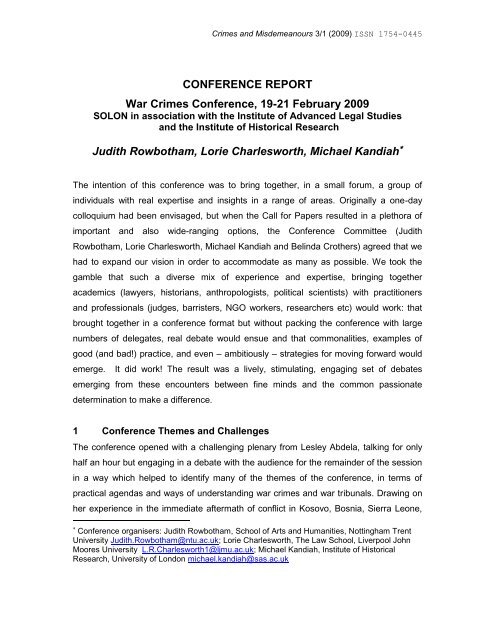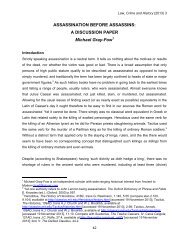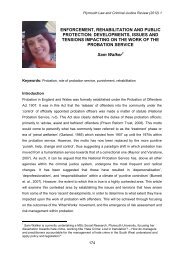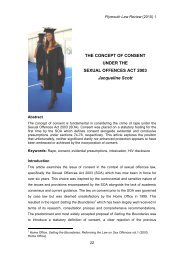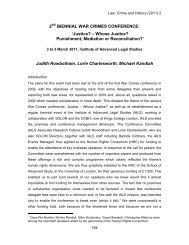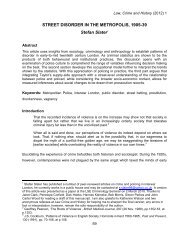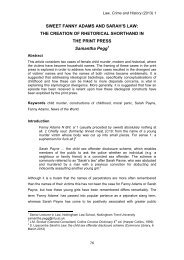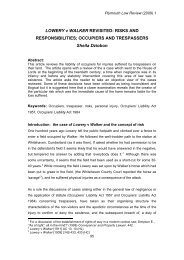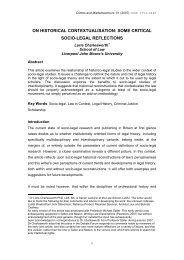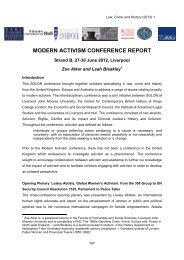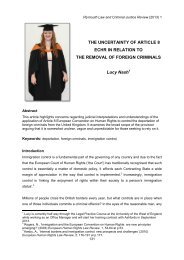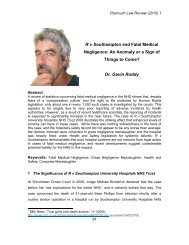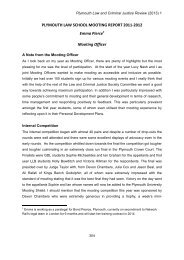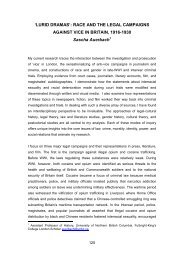Judith Rowbotham, Lorie Charlesworth and Michael Kandiah
Judith Rowbotham, Lorie Charlesworth and Michael Kandiah
Judith Rowbotham, Lorie Charlesworth and Michael Kandiah
Create successful ePaper yourself
Turn your PDF publications into a flip-book with our unique Google optimized e-Paper software.
Crimes <strong>and</strong> Misdemeanours 3/1 (2009) ISSN 1754-0445<br />
CONFERENCE REPORT<br />
War Crimes Conference, 19-21 February 2009<br />
SOLON in association with the Institute of Advanced Legal Studies<br />
<strong>and</strong> the Institute of Historical Research<br />
<strong>Judith</strong> <strong>Rowbotham</strong>, <strong>Lorie</strong> <strong>Charlesworth</strong>, <strong>Michael</strong> K<strong>and</strong>iah <br />
The intention of this conference was to bring together, in a small forum, a group of<br />
individuals with real expertise <strong>and</strong> insights in a range of areas. Originally a one-day<br />
colloquium had been envisaged, but when the Call for Papers resulted in a plethora of<br />
important <strong>and</strong> also wide-ranging options, the Conference Committee (<strong>Judith</strong><br />
<strong>Rowbotham</strong>, <strong>Lorie</strong> <strong>Charlesworth</strong>, <strong>Michael</strong> K<strong>and</strong>iah <strong>and</strong> Belinda Crothers) agreed that we<br />
had to exp<strong>and</strong> our vision in order to accommodate as many as possible. We took the<br />
gamble that such a diverse mix of experience <strong>and</strong> expertise, bringing together<br />
academics (lawyers, historians, anthropologists, political scientists) with practitioners<br />
<strong>and</strong> professionals (judges, barristers, NGO workers, researchers etc) would work: that<br />
brought together in a conference format but without packing the conference with large<br />
numbers of delegates, real debate would ensue <strong>and</strong> that commonalities, examples of<br />
good (<strong>and</strong> bad!) practice, <strong>and</strong> even – ambitiously – strategies for moving forward would<br />
emerge. It did work! The result was a lively, stimulating, engaging set of debates<br />
emerging from these encounters between fine minds <strong>and</strong> the common passionate<br />
determination to make a difference.<br />
1 Conference Themes <strong>and</strong> Challenges<br />
The conference opened with a challenging plenary from Lesley Abdela, talking for only<br />
half an hour but engaging in a debate with the audience for the remainder of the session<br />
in a way which helped to identify many of the themes of the conference, in terms of<br />
practical agendas <strong>and</strong> ways of underst<strong>and</strong>ing war crimes <strong>and</strong> war tribunals. Drawing on<br />
her experience in the immediate aftermath of conflict in Kosovo, Bosnia, Sierra Leone,<br />
Conference organisers: <strong>Judith</strong> <strong>Rowbotham</strong>, School of Arts <strong>and</strong> Humanities, Nottingham Trent<br />
University <strong>Judith</strong>.<strong>Rowbotham</strong>@ntu.ac.uk; <strong>Lorie</strong> <strong>Charlesworth</strong>, The Law School, Liverpool John<br />
Moores University L.R.<strong>Charlesworth</strong>1@ljmu.ac.uk; <strong>Michael</strong> K<strong>and</strong>iah, Institute of Historical<br />
Research, University of London michael.k<strong>and</strong>iah@sas.ac.uk
Crimes <strong>and</strong> Misdemeanours 3/1 (2009) ISSN 1754-0445<br />
Iraq, Afghanistan, Acheh <strong>and</strong> most recently, Nepal, Lesley talked of the importance of<br />
making the identification <strong>and</strong> definition of war crimes, <strong>and</strong> their subsequent prosecution,<br />
more than an admirable concept; <strong>and</strong> into something which can actually help in postconflict<br />
reconstruction in such societies. Her particular emphasis was on gender as a key<br />
factor in reconstructing citizenship, <strong>and</strong> she talked of the issue of rape, <strong>and</strong> its wider<br />
implications for the legal process. That was a theme which regularly re-emerged during<br />
the conference, as part of the debate over whether it was possible to identify some<br />
international code, <strong>and</strong> even more importantly, language, of rights which could unite all<br />
the participants in war crimes trials. Defining the nature of a war crime, in the cultural<br />
spaces of the local/national <strong>and</strong> the international was a key problematic: Lesley pointed<br />
out it was only recently that rape had been identified formally as a war crime, <strong>and</strong> this<br />
identification was hedged around with problems. She posed the question, why is a man<br />
injured in war a hero, while a woman raped in war is an embarrassment: are they not<br />
both ‘wounded’ in war Should there not be memorials to both Which, in turn, led to<br />
another debate much discussed during sessions, breaks <strong>and</strong> dinners in the conference:<br />
is it useful to talk of the ‘victims’ of war crimes, certainly when we are talking of the living.<br />
Are they not offered a better respect when the terminology of victimhood <strong>and</strong> its<br />
implications are avoided Might ‘witnesses’ or ‘survivors’ be a better set of labels,<br />
especially in terms of their ability to reconstruct themselves as individuals <strong>and</strong><br />
communities in the post-conflict world Debate over this was a sustained trope for the<br />
remainder of the conference.<br />
Another challenge was looking beyond the rhetoric to underst<strong>and</strong> the dimensions, <strong>and</strong><br />
so begin to find answers to, the question of who was undertaking the war crimes trials<br />
<strong>and</strong> on whose behalf The debate threw up another important point: that the politics of<br />
justice are complicated <strong>and</strong> it is not always easy to apportion ‘blame’ or the label of<br />
being ‘in the right’; partly because of the complications of the ways in which treaties are<br />
written (war crimes such as rape may continue after a treaty is concluded, but they no<br />
longer acquire the label <strong>and</strong> so are not considered treaty violations). There is also the<br />
issue of what should be the role of the International Criminal Court: should it involve<br />
itself in post-conflict resolution, or was that aspect of war crimes tribunals for other<br />
agencies <strong>and</strong> agendas Was it possible, or desirable, to draw a line between the work of<br />
war crimes tribunals, especially where the ICC was involved, <strong>and</strong> other agencies (local,<br />
national <strong>and</strong> international) And what kind of justice was being sought How could, <strong>and</strong>
Crimes <strong>and</strong> Misdemeanours 3/1 (2009) ISSN 1754-0445<br />
indeed should, international jurisprudence trickle down into domestic courts Should the<br />
ICC have a role in this It was agreed that in many ways, ‘justice’, certainly as it was<br />
perceived by those who suffered from or were affected by war crimes in some way, was<br />
often contained in the interstices of procedure, <strong>and</strong> that was a real complication.<br />
By the end of the opening session, it was plain that one of the themes that would<br />
regularly emerge was the challenge to academics to find ways of providing work which<br />
could be used to inform <strong>and</strong> support war crimes initiatives, especially in the courts. A<br />
challenge for practitioners <strong>and</strong> professionals in the field, was finding the best way of<br />
establishing good practice, respecting local differences while supporting the concept of<br />
international law (<strong>and</strong> so characterised by a fundamental agreement on key constituent<br />
elements), <strong>and</strong> an international code of practice that respected – even gave primacy to<br />
– the national dimension. In succeeding parallel sessions <strong>and</strong> plenaries, these issues,<br />
<strong>and</strong> their relationship to particular themes, regions <strong>and</strong> agendas, were to reappear in<br />
both the presentations <strong>and</strong> the debates. It was accepted that there were many (too<br />
many) different jurisdictions <strong>and</strong> court processes when it came to war crimes tribunals.<br />
How did this contribute to, or work against, the fight to establish good practice<br />
This theme was particularly apparent in the Thursday evening Round Table, when<br />
Lesley Abdela again challenged the conference to consider the concept that we were<br />
talking about lessons identified, <strong>and</strong> not yet lessons learned. Talking of war crimes<br />
tribunals, she suggested that one thing emerging already from the conference was the<br />
issue of their timing, because it bore so importantly on the question of what kind of postconflict<br />
justice is acceptable overall Is it important to have elections first, to establish<br />
‘democracy’ Or should there be moves first to deal with war crimes, through<br />
international or national (or both) tribunals in that the outcome of tribunals (or Truth <strong>and</strong><br />
Reconciliation Commissions, alternatively) had the power to affect, profoundly, people’s<br />
relationship with a post-conflict constitution <strong>and</strong> its democracy As the debate revealed,<br />
the issue was very strongly that of where should prosecutions take place Were hybrids<br />
between the national <strong>and</strong> the international tribunals the way forward This was a<br />
particularly crucial issue given the time factors (Shireen Fisher estimated that the trials in<br />
Bosnia could be sustained for perhaps another ten years before key witnesses died <strong>and</strong><br />
made such trials practically impossible) <strong>and</strong> the geographical realities of distance. Was it<br />
important at times for there to be such a distance as to justify trials in The Hague; or
Crimes <strong>and</strong> Misdemeanours 3/1 (2009) ISSN 1754-0445<br />
was it always going to be preferable to locate trials in the affected region, given that<br />
travel was likely always to be an issue for witnesses if only for cost reasons<br />
The economic dimension came up as a regular theme, but we all felt it to be a deficiency<br />
that we had not had specialists in this aspect come forward. It was agreed, for instance,<br />
that the current global economic crisis had real <strong>and</strong> worrying consequences for<br />
successful war crimes tribunals: the support available for witnesses (<strong>and</strong> this dimension<br />
was, anyway, another issue raised as a real problem under current arrangements),<br />
especially vulnerable ones such as women who had been raped. It was pointed out that<br />
historically, <strong>and</strong> even today, one of the things which was generally carried on during a<br />
war was trade: today it was likely to be illegal rather than legal trade, as in the case of<br />
the Mafia in Bosnia, but that was a dimension that needed to be explored further.<br />
2 Contextualising the Issues<br />
Some papers stressed the notion that war crimes had to be seen in the context of their<br />
historical circumstances <strong>and</strong>, consequently, how these circumstances played out. This<br />
helped explain how war crimes were prosecuted <strong>and</strong> how nations were subsequently<br />
confronted – or perhaps even more importantly – failed to confront the past. For<br />
instance, Effie Pedaliu’s paper on the war crimes perpetrated by Italy during World War<br />
II argued that the advent of the Cold War <strong>and</strong> a desire for reconciliation within the postwar<br />
Italian state led to very few offenders being prosecuted. Pedaliu further argued that<br />
this has led to the fundamental political instability of the modern Italian state, providing<br />
an interesting illustrative response to Lesley Abdela’s query whether it was sensible to<br />
move to elections without dealing first with the issue of war crimes through some means.<br />
Other papers, such as that given by Peter Rushton <strong>and</strong> Gwenda Morgan, revealed the<br />
historical origins of attitudes which colour a state’s practice when dealing with war<br />
crimes. They explored the perceived importance of an observance of legal protocols<br />
during the American Revolution/War of Independence, which found real echoes with the<br />
strategies adopted by defence lawyers as depicted in the powerfully delivered panel<br />
featuring Joe McMillan, Michel Paradis <strong>and</strong> Melissa Epstein Mills, on prosecutions in<br />
Guantanamo Bay, <strong>and</strong> the prosecution of US servicemen for misconduct during the Iraq<br />
war.
Crimes <strong>and</strong> Misdemeanours 3/1 (2009) ISSN 1754-0445<br />
Equally, the historical dimension demonstrated that it was the label of ‘war crime’ that<br />
was new: many of the crimes now encompassed under that banner were already wellestablished<br />
as atrocities in war, as in the case of rape. This reality was forcefully<br />
addressed in the panel featuring Bonita Meyersfeld, Rirh<strong>and</strong>u Mageza-Barthel <strong>and</strong><br />
Daniela De Vito. As their presentations <strong>and</strong> the subsequent discussions emphasised, it<br />
had to be accepted that sexual violence, particularly (but not exclusively) against women<br />
was integral to the way in which perpetrators committed war crimes, regardless of<br />
location. But as the talks delivered by, amongst others, Cissa Wa Numbe <strong>and</strong> Erasmus<br />
Ndemole Migyikra stressed, sexual violence – elevated at times to being a tool in a<br />
deliberate genocide – is best understood as part of an overall pattern of war crimes. This<br />
means that the case studies of events <strong>and</strong> tribunals in particular regions have a very<br />
significant role to play in furthering strategies for dealing with war crimes, whether<br />
judicially or socially, as Timothy Waters, Valerie Arnould <strong>and</strong> Iryna Marchuk<br />
demonstrated. It was very impressive to hear the range of papers on Bosnia also; in<br />
particular the panel based around the experiences of the Prosecutor’s Office <strong>and</strong> the<br />
UNDP in Bosnia-Herzegovina. Aided by their Chair, Shireen Fisher (who, until 2008, was<br />
an International Judge there) Toby Cadman, Iva Vukusic <strong>and</strong> Alma Dedic provided an<br />
absorbing set of insights into the developments there.<br />
In this conference, a particular focus was given to Bosnia, <strong>and</strong> to a range of African<br />
experiences, particularly in Congo <strong>and</strong> Rw<strong>and</strong>a but with attention also to Sudan/Darfur<br />
<strong>and</strong> to Sierra Leone, <strong>and</strong> to the lesser known events in Cambodia (Silke Studzinsky<br />
brought us the latest news on the trials just beginning there) <strong>and</strong> South America: as well<br />
as Peru, the resounding closing plenary delivered by David Sugarman testified to the<br />
importance of a global, as well as a historical, comprehension in order to underst<strong>and</strong> the<br />
impact of war crimes, especially when war crimes tribunals are not an automatic<br />
resource. One of the great regrets of the conference was that the overly complicated<br />
visa system now operating for entry to the UK meant that one speaker on African<br />
experiences in Ug<strong>and</strong>a that many were very eager to hear was not able to be present:<br />
Lawrence Dulu Adrawa of the African Development <strong>and</strong> Peace Initiative. However, we<br />
are seeking to get a copy of his paper which could be posted on the SOLON website, or<br />
form part of a future issue of Crimes <strong>and</strong> Misdemeanours. At this stage, the issue<br />
becomes whether to mention individually every one of the fine papers delivered in this<br />
Report: as it is already a lengthy document <strong>and</strong> there were over 40 speakers! We
Crimes <strong>and</strong> Misdemeanours 3/1 (2009) ISSN 1754-0445<br />
resisted the temptation <strong>and</strong> have continued to focus on themes <strong>and</strong> some examples<br />
illuminating broader issues, but wish to stress our gratitude, again, to those speakers<br />
who we have not so far singled out in relation to a particular point or theme: all the<br />
papers worked together to form an impressive whole <strong>and</strong> the ‘glue’ was the debate<br />
which was part of each session, <strong>and</strong> part of the conversation between sessions. To<br />
emphasise this, we have put a link to the Abstracts at the end of the Report, <strong>and</strong> a copy<br />
of the final conference programme also.<br />
3 Conference Reflections<br />
Despite the horrors that characterise war crimes, it has to be commented that from the<br />
debate following the opening plenary on, one very positive aspect emerged organically<br />
<strong>and</strong> was sustained during the various papers <strong>and</strong> discussions, becoming a conference<br />
trope. That is the extent to which so many individuals professionally involved in the<br />
aftermath of war crime, including investigators, judges, lawyers <strong>and</strong> others were<br />
passionately engaged in, <strong>and</strong> committed to their work beyond ‘normal’ professional<br />
duties, in ways that comm<strong>and</strong>ed the enormous respect <strong>and</strong> admiration of the<br />
Conference Organisers. The range <strong>and</strong> scope of the commitment demonstrated, in a<br />
humbling manner, that original discipline <strong>and</strong> formal qualifications need be no bar to<br />
involvement, witness the role played by Konrad Kweit <strong>and</strong> his team of historians in<br />
bringing Lithuanian Nazis to trial in Australia; something that was also emphasised by<br />
David Fraser’s powerful <strong>and</strong> challenging plenary. Again, the paper on representing<br />
victims before the ICC given by H C<strong>and</strong>ace Gorman, contextualised by her inspiring<br />
contribution to discussions through the conference, raised the possibility of<br />
interdisciplinary pro bono work being developed to aid war crimes trials – something that<br />
SOLON will be very interested to help forward. It was not just the speakers: many of the<br />
delegates present had tales to tell which demonstrated the same energetic dedication.<br />
For instance, we think of Martha Baker <strong>and</strong> her contribution to defining rape as a war<br />
crime. Such levels of commitment require broader public recognition. We hope that the<br />
SOLON website will be able to provide a way of informing people of developments in<br />
these various areas. .<br />
But overall, most people agreed that there were certain universal themes spanning the<br />
historical <strong>and</strong> the modern <strong>and</strong> that because of this, there was a real need for information<br />
– accounts <strong>and</strong> analyses which practitioners in the field could draw on to help. In that
Crimes <strong>and</strong> Misdemeanours 3/1 (2009) ISSN 1754-0445<br />
sense it is important also to stress successes more than failures: it is always easy to<br />
repeat a failure, it was pointed out. However, the creation of a synthesis – a manual – of<br />
what makes a successful tribunal was a genuinely urgent need. Whenever a new court<br />
is created, it has to create a legal culture for itself – a reference guide of what has<br />
worked elsewhere could help to avoid the repetition of old mistakes. The issue of the<br />
value of such prosecutions was considered, notably in S<strong>and</strong>eep Gopalan’s paper on<br />
Bush <strong>and</strong> Co as ‘war criminals’, which argued that it was not in anyone’s interests to<br />
pursue such a path. Providing a challenge to this, though, Cissa Wa Numbe asked if, in<br />
the light of the targets identified by the ICC <strong>and</strong> international tribunals generally, it was<br />
possible to say that these courts were appropriately accountable <strong>and</strong> were identifying<br />
the people who needed to be prosecuted. How far were such courts located in, <strong>and</strong><br />
focusing on, the weaker states, the economically poorer <strong>and</strong> less powerful entities <strong>and</strong><br />
individuals Erasmus Migyikra, contributing to the first round table with his experiences<br />
in Sudan/Dafur, had also raised this issue. As this issue of Crimes <strong>and</strong> Misdemeanours<br />
goes to press, events in Sudan are providing substance for their concern. We in the<br />
West do have to think seriously about this perception of the ICC. Whether or not it is<br />
justified is the most urgent question; but it provides a serious challenge to the idea put<br />
forward by other speakers that there is, somehow, a consensus about the discourse, the<br />
purpose <strong>and</strong> the nature of international justice. It is a gr<strong>and</strong> hope, but as we write this<br />
Report, we find ourselves unable to accept that that hope is perceived as it needs to be,<br />
if the ICC is to work as a conduit for a genuinely international justice. Are we talking the<br />
same language Can we talk the same language<br />
This is indeed a critical issue for us all to confront. Events in Sudan mean that it is not an<br />
issue that should be put off. It matters now, as media reportage underlines that there is a<br />
substantial Sudanese perception that the arrest warrant issued by the ICC on 4 March<br />
2009 against the President of Sudan, Omar al-Bashir, by the ICC is part of a neocolonial<br />
conspiracy against the country. There have been angry accusations from within<br />
Sudan that the ICC is only interested in prosecuting those in the ‘weaker’ states, in a<br />
disturbing echo of the conference questioning. This development is also accompanied,<br />
according to reports on 5 March 2009, by the worrying news that a number of<br />
international aid agencies are being evicted from Sudan/Dafur because they are labelled<br />
as having a negative political agenda, potentially causing a humanitarian disaster <strong>and</strong>
Crimes <strong>and</strong> Misdemeanours 3/1 (2009) ISSN 1754-0445<br />
the opportunity for further war crimes. We clearly need to reflect on what are the wider<br />
implications of this for the effectiveness of the ICC <strong>and</strong> its ability to deliver justice.<br />
Another question raised was whether it is necessary, if a genuine format for international<br />
justice is to be achieved, to identify a second category of war crimes <strong>and</strong> criminals:<br />
those who aided or were in some way complicit in the committal of war crimes; those<br />
whose aid or compliance was essential to the performance of war crimes without them<br />
being actually the perpetrators. It should not matter, as both Erasmus Migyikra <strong>and</strong><br />
Cissa Wa Numbe argued, in a challenge to us in the West, who the perpetrators were, in<br />
terms of status, nationality or prominence. If they could be identified, should they not be<br />
prosecuted All injustice needed to be dealt with. And as Jose Pablo Baraybar insisted,<br />
given the numbers (of victims, witnesses, perpetrators) involved in so many modern war<br />
crimes, there was also a problem with the retributive justice process of the law invoked<br />
in war crimes tribunals. There were aspects of post conflict dealing with war crimes that<br />
could not wait for the slow realities of the law. Returning to the theme of what the<br />
agenda of these tribunals should be, he urged the need to involve aspects of civil society<br />
in the delivery of justice to those awaiting it in the aftermath of what he described as a<br />
‘permanent’ crime for which society dem<strong>and</strong>ed justice, if it was to heal – even if it meant<br />
damaging a possible legal case; again something which leads the authors of this report<br />
back to events in the Sudan, <strong>and</strong> the question of what strategies best deliver a form of<br />
justice acceptable to those affected by war crimes. Yet, in the end, the conference<br />
finished on a high note with the concluding plenary from David Sugarman, reflecting<br />
through the example of the trope of memory in Chile on many of the themes <strong>and</strong> issues<br />
brought up elsewhere in the conference.<br />
Finally….<br />
In the concluding Round Table, several key points were held by speakers such as Silke<br />
Studzinsky <strong>and</strong> Jose Pablo Baraybar to have been identified during the conference.<br />
First, it is now time to have a review of the existing war crimes tribunals, including the<br />
ICC, <strong>and</strong> to question the extent to which there is a rule of law which is st<strong>and</strong>ard to them.<br />
It seems to be agreed by most there that distant courts are not the answer in the majority<br />
of cases of trials for war crimes: there is a need for these to be as local as possible,<br />
which also raises issues of the compositions of juries in national <strong>and</strong> international<br />
tribunals. It is agreed that there needs to be a focus on other institutions <strong>and</strong> what their
Crimes <strong>and</strong> Misdemeanours 3/1 (2009) ISSN 1754-0445<br />
role in the creation of post-war justice should be – including states <strong>and</strong> bodies such as<br />
the EU, the USA, NATO <strong>and</strong> the UN. It was suggested that while there was much<br />
discussion from them, there needed to be talks about them in this context.<br />
Questions it is felt important to ask – <strong>and</strong> academics were targeted here as the people to<br />
carry forward this task, though obviously in collaboration with practitioners <strong>and</strong><br />
professionals – include: who are the trials for Are they for the peoples affected by an<br />
individual set of war crimes, or to further international ideas of ‘justice <strong>and</strong> civilisation’<br />
Do we want such justice Do we want what such justice brings Who should develop the<br />
reparation formulae, <strong>and</strong> should reparation, rather than the war crimes tribunals be the<br />
main thing, since it could affect more, in practical terms, than the tribunals There was<br />
also an issue brought up directly by Arzoo Syeddah <strong>and</strong> Kate Wright, <strong>and</strong> was implicit in<br />
many other talks: ‘How Do We Get Audiences to Give a Damn About the Congo (<strong>and</strong> for<br />
Congo, read any location from Acheh to Peru) What Sort of a Damn Do We Want<br />
Them to Give’ How can the media be persuaded to engage with war crimes in ways<br />
which connect <strong>and</strong> engages their audiences, <strong>and</strong> so sustains a continuity of reportage,<br />
instead of brushing it under the carpet as too often happens. Is there such a thing as<br />
compassion fatigue The Victorians, as <strong>Judith</strong> <strong>Rowbotham</strong> pointed out, would not have<br />
thought so: why is it identified as a feature of the modern l<strong>and</strong>scape Excuse or reality<br />
As the conference progressed, it became clear that there was the need – even the<br />
dem<strong>and</strong> – for another conference. It is felt that a suitable time would be two years from<br />
February 2009: sometime in the spring of 2011. Again, the idea will be to keep the<br />
process small, to facilitate discussion. The organisers hope that they will see there not<br />
just people reporting back on what has happened – or not happened – in the projects<br />
with which they were involved, identifying – as Shireen Fisher asked – the successes,<br />
the ‘what worked’ elements as much if not more than the failures (of actions or of<br />
inactions). But they will also hope to exp<strong>and</strong> not just the chronological framework (the<br />
involvement of several historians looking back beyond the twentieth century has been<br />
held to be of real value by several practitioners at least) but also the conceptual <strong>and</strong><br />
geographical areas for discussion. There will, we hope, be discussions of places like<br />
Acheh <strong>and</strong> Timor, <strong>and</strong> of the prosecutions of war crimes not so labelled, but essentially<br />
war crimes in all other respects – as in Argentina. But a key str<strong>and</strong> will remain a<br />
continuity of reflection. Therefore, the draft of the Call for Papers will be circulated, for
Crimes <strong>and</strong> Misdemeanours 3/1 (2009) ISSN 1754-0445<br />
comment <strong>and</strong> amendment, to the speakers <strong>and</strong> other participants at this first War<br />
Crimes conference before being circulated more widely.<br />
Finally, it is hoped that – in a variety of formats – the majority of the presentations at the<br />
conference will be published. Some will appear in a special edition of this journal; <strong>and</strong><br />
the organising committee are in discussions with publishers over an edited volume. It is<br />
also proposed that there will be a range of accompanying material which can be lodged<br />
on the SOLON website in the intervening time before the next conference, to help keep<br />
interested people up to date. In organising this interdisciplinary conference at the<br />
Institute of Advanced Legal Studies, facilitated by IALS, along with fellow institutions in<br />
the School of Advanced Study at the University of London (Centre for Contemporary<br />
British History <strong>and</strong> the Institute of Commonwealth Studies) SOLON owes a great debt to<br />
Belinda Crothers at IALS for her practical organisation (without her, it would never have<br />
happened!) – but once again, we return to the reality that we owe a great debt to our<br />
speakers <strong>and</strong> participants, many of whom made huge efforts <strong>and</strong> considerable sacrifices<br />
to enable them to get here, <strong>and</strong> who have now returned to work that is neither a sinecure<br />
nor carries a guarantee of personal safety. It was they who made the conference the<br />
humbling, worrying but also at times inspiring, call to action that it turned into. Thank<br />
you!<br />
Conference Programme<br />
Speakers Profiles


